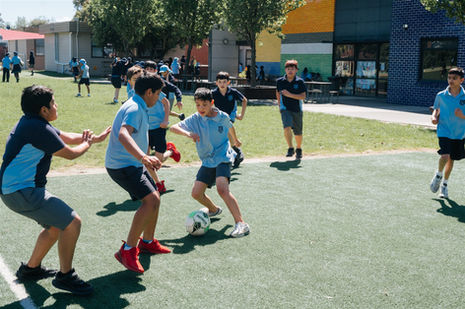
EVERY CHILD WILL EXPERIENCE SUCCESS
ST PETER'S PRIMARY SCHOOL EPPING

Learning & Teaching
Units of Inquiry
St. Peter’s adopts cross curriculum integration into cyclical units of inquiry. These embed all other areas of the curriculum including:
Science:
-
understanding – biological sciences, chemical sciences, earth and space sciences, physical sciences;
-
Science as a human endeavour, incorporating the nature and development of Science, its use and influence; and
-
Science inquiry skills – questioning and predicting, planning and conducting, processing and analysing data, evaluating and communicating.
Together, these strands of the Science curriculum provide students with understanding, knowledge and skills through which they can develop a scientific view of the world. Students are challenged to explore science, its concepts, nature and uses through clearly described inquiry processes that are also enhanced within the STEM program.
Civics and Citizenship:
The Civics and Citizenship curriculum is all about ensuring students have the skills and values to become active and informed citizens. Students will investigate political and legal systems, and explore the nature of citizenship, diversity and identity in contemporary society.
The Civics and Citizenship curriculum is designed to foster students’ commitment to national values of democracy, equity and justice. This curriculum will develop students’ appreciation of Australia’s diversity and, overall, “what it means to be a citizen”. It explores ways in which students participate in Australia’s civic life and make a positive contribution as local and global citizens that links our Catholic Social Teachings to ‘make a difference and act for the common good.’
History and Geography:
An awareness of family history and community heritage starts in junior school. Students learn about their own social context of family, friends and school, and the significance of the past. They engage with the remains of the past; develop a concept of time as present, past and future and through role play use their imagination to speculate about the lives of others in the past. As our students move up through to Senior school, the focus is on local and national history and use of a range of sources. Students develop their understanding of the world and their relationship to others past and present. Students begin to better understand and appreciate different points of view and to develop an awareness of justice and fair play.
Geographical knowledge enhances the history curriculum as it teaches students to respond to questions in a geographically distinctive way; plan inquiries; collect, evaluate, analyse and interpret information and suggest responses to what they have learnt. Students have opportunities to develop a wide range of general skills, capabilities and dispositions that can be applied in everyday life. Students develop information and communication technology skills; an appreciation and respect for social, cultural and religious diversity and different perspectives; an understanding of ethical research principles; a capacity for teamwork, and an ability to solve problems and to think critically and creatively.

Specialist Classes
Specialist Classes
St. Peter’s offers a broad range of learning opportunities to extend and challenge our students' creative, social and physical development. Each week our students engage in the following curriculum areas that are facilitate by our specialist teaching staff:
STEM (incorporating Sciences, Mathematics and the Technologies)
Visual Arts
Through Visual Arts, students make and respond using their knowledge, understanding and skills to express personal views. Visual Arts engages students in discovery, experimentation and problem solving, utilising visual techniques, technologies, practices and processes. Learning in the Visual Arts helps to enable our students to become increasingly confident and proficient in achieving their personal visual aesthetic, while appreciating and valuing that of others. Visual Arts includes the fields of art, craft and design. Students create visual art works that communicate, challenge and express their own and others’ ideas. They develop perceptual and conceptual understanding, critical reasoning and practical skills by exploring and expanding their understanding of the world. The school celebrates the Visual Arts curriculum by hosting a community Art Show, showcasing our students' creative art pieces.
Health and Physical Education
Through specialist Health and Physical Education classes and in-classroom sport activities, as well as extra-curricular sport programs such as inter school sports, Perceptual Motor Program, Gymnastics, Water Safety, Athletics and Cross-Country, St. Peter’s aims to promote health and physical education by:
-
developing students’ capacities to make decisions and act in ways that promote their health and that of others
-
focusing on the important role physical activity plays in the lives of all students by providing opportunities for personal growth, enjoyment and challenge
-
promoting understanding and valuing of one’s personal identity and development and the need for positive relationships
Italian Teachers as CoLearners TCL
We believe that every student is entitled to a quality languages education program. Learning a language means learning about what it means to be literate. Research tells us that the experience of learning another language not only improves our knowledge of how languages work but also enhances our thinking skills as we learn the English language as well.
Recently, the school community saw St. Peter’s staff and students embark on a new languages journey, which embraces the Teachers as Co Learners (TCL) pedagogical approach to language learning. In a TCL approach all teachers and students are learners of the target language, which in our case is Italian. Time is allocated everyday to ensure frequent exposure to, and learning of, both Italian and English.
The aim of our language program is to encourage all community members to develop the skills to converse in Italian. Our Italian teacher leader meets with teachers weekly to teach them new words and phrases and provides modelling and resources for teachers to use daily. Our lead Italian teacher visits each class once a week to model how we can use these words and phrases to speak to one another in Italian.
Quality Learning & Teaching in Action







































































